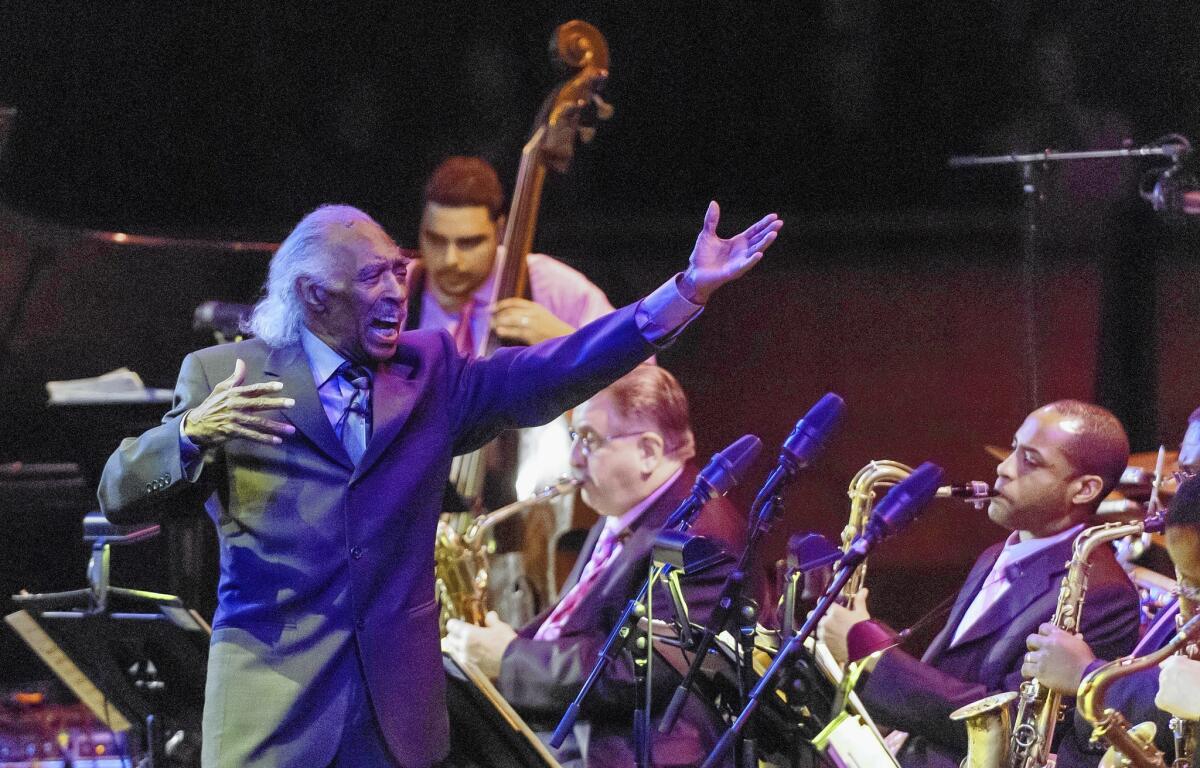Jazz musician Gerald Wilson dies at 96

Gerald Wilson, a bandleader, trumpeter, composer, arranger and educator whose multifaceted career reached from the swing era of the 1930s to the diverse jazz sounds of the 21st century, has died. He was 96.
Mr. Wilson, who had been in declining health, died Monday at his home in Los Angeles two weeks after contracting pneumonia, said his son, jazz guitarist Anthony Wilson.
In a lifetime that spanned a substantial portion of the history of jazz, Mr. Wilson’s combination of articulate composition skills and far-reaching creative vision carried him successfully through each of the music’s successive evolutions.
He led his own Gerald Wilson Orchestras — initially for a few years in the mid-1940s, then intermittently in every succeeding decade — recording with stellar assemblages of players, continuing to perform live well after big jazz bands had been largely eclipsed by small jazz groups and the ascendancy of rock music.
Mr. Wilson had deep ties to Chicago, starting with his visit in 1933.
“I went to the World’s Fair when I was 15, and I fell in love with the city at that time because it was so different from where I had come from,” Mr. Wilson told the Tribune in 2011, reflecting on his journey from the South.
“I was thrilled to death with the way things were in Chicago … I didn’t have to go to the back of the streetcar. I was thrilled with what was at the Regal Theater — I saw Cab Calloway, the Mills Brothers, everyone.”
He returned to the city in the early 1940s, when President Franklin Roosevelt said the Navy could “make a beginning” toward integration by forming “good Negro bands.” Mr. Wilson and other future jazz stars played in bands at the Great Lakes Naval Training Center near Waukegan.
Mr. Wilson later expressed his ongoing affection for Chicago through music. He led the world premieres of his “Yes Chicago Is …” suite at the Chicago Jazz Festival in 2008 and his “State Street Sweet” at the fest in 1994, both subsequently released on critically acclaimed albums (“Legacy” and “State Street Sweet”).
Seeing and hearing Mr. Wilson lead his ensembles — especially in his later years — was a memorable experience for jazz fans. Garbed in well-tailored suits, his long white hair flowing, he shaped the music with dynamic movements and the elegant grace of a modern dancer.
He told Terry Gross on NPR’s “Fresh Air” in 2006: “I move. I choreograph the music as I conduct.”
That approach to conducting, combined with the dynamic quality of his music, had a significant effect on the players in his ensembles.
“There’s no way you can sit in Gerald’s band and sit on the back of your chair,” bandleader/arranger John Clayton told the Detroit Free Press. “He handles the orchestra in a very wise and experienced craftsman sort of way. The combination of the heart and the craft is in perfect balance.”
Always an adventurous composer, Mr. Wilson’s big band music often had a personal touch, aimed at displaying the talents of a specific player or inspired by many of his family members. After marrying his Mexican American wife, Josefina Villasenor Wilson, he was drawn to music possessing Spanish/Mexican qualities.
“His pieces are all extended, with long solos and long backgrounds,” musician/jazz historian Loren Schoenberg told the New York Times in 1988. “They’re almost hypnotic. Most are seven to 10 minutes long. Only a master can keep the interest going that long, and he does.”
Gerald Stanley Wilson was born Sept. 4, 1918, in Shelby, Miss. He began to take piano lessons with his mother, a schoolteacher, when he was 6. After purchasing an instrument from the Sears Roebuck catalog for $9.95, he took up the trumpet at age 11.
The absence of a high school for African-Americans in segregated Shelby made it necessary for him to begin his secondary school studies in Memphis. But a trip with his mother to the Chicago World’s Fair in 1933 stimulated a desire to move north; and he was sent to live with friends in Detroit, where he attended and graduated from the highly regarded Cass Technical High School.
An adept trumpeter while still in his teens, Mr. Wilson played at Detroit’s Plantation Club before joining the Chic Carter touring band. In 1939 he replaced trumpeter/arranger Sy Oliver in the Jimmy Lunceford Orchestra, then one of the nation’s most prominent swing bands.
Wilson served in the Navy at the Great Lakes Naval Training Center during World War II, then moved to Los Angeles, forming his own big band in 1944.
As he moved into his 60s, Mr. Wilson viewed the commercial activity of his earlier years as the foundation that allowed him to concentrate on his creative efforts.
He had worked hard, he told the Boston Globe, so that in his later years he would no longer “have to go hustling any jobs. I have written for the symphony. I have written for the movies, and I have written for television. I arrange anything. I wanted to do all these things. I’ve done that. Now I’m doing exactly what I want, musically, and I do it when I please. I’m a musician, but first and foremost, a jazz musician.”
Besides his wife and his son, Wilson is survived by daughters Jeri and Nancy Jo and four grandchildren.
Tribune reporter Howard Reich contributed.
More to Read
Start your day right
Sign up for Essential California for the L.A. Times biggest news, features and recommendations in your inbox six days a week.
You may occasionally receive promotional content from the Los Angeles Times.






